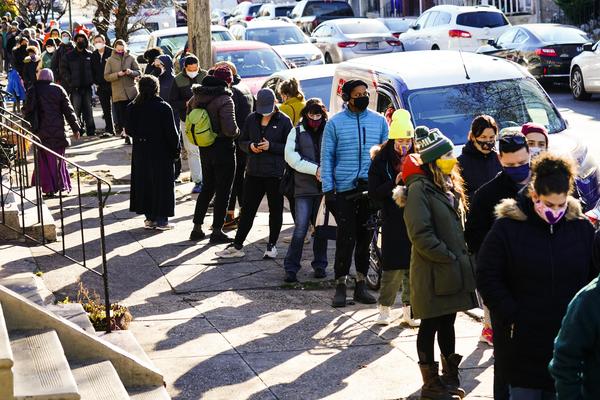AP EXPLAINS: Omicron, how it works and what remains to be learned
It only took a few weeks for the new omicron variant of the coronavirus to fulfill dire predictions about its enormous contagiousness, but scientists still don't know if it causes more severe disease, as the world grapples with an explosion of cases just before Christmas.
"Everything is riskier now because omicron is so much more contagious," said Dr. S. Wesley Long, who directs the testing lab at Houston Methodist Hospital, and who in the past week has canceled several plans to avoid exposure.
Omicron is now the dominant variant in the United States, federal health officials said Monday, accounting for nearly three of every four new infections last week.
Its rate of spread, which exceeds even that of the delta variant, has public health officials stumped. Within three weeks, omicron accounts for 80% of new symptomatic cases diagnosed at Houston Methodist Hospital testing centers. The delta variant took three months to reach that same level, Long explained.
advertisementThe rapid spread of the mutation and its ability to evade immunity came at a bad time: just as travel increased and many people let their guard down.
In any case, it is still unclear how the omicron wave will affect the world, as there are many unanswered questions. Here the latest that is known and what is still to be known about this variant.
___
HOW MUCH PROTECTION DO VACCINES OFFER?
Vaccines given in the United States and around the world do not offer as much protection against omicron as they have against previous versions of the coronavirus. However, they are still very helpful.
Laboratory tests show that, although two doses are not enough to prevent infection, a booster shot of the Pfizer or Moderna vaccine produces antibodies that fight the virus and are capable of dealing with omicron.

Antibody levels naturally decline over time, and a boost raises them again, 25-fold in the case of Pfizer's extra shot and 37-fold in Moderna's.
No one knows exactly what level is high enough, or how long it will be before antibody levels start to drop again.
After a boost, protection against an omicron infection is still 20% less than protection against the delta variant, said Dr. Egon Ozer of Northwestern University.
But if the virus gets past that first line of defense, those vaccinated have additional layers of protection.
"Vaccines are going to protect against severe disease, hospitalization and death," said Long, of Methodist Hospital. "And that's really the most important thing."
Those additional defenses include T cells that mobilize to fight off the virus, as well as memory cells that, once reactivated, speed up to make more numerous and stronger antibodies.
___
WHAT ABOUT NATURAL IMMUNITY?
It appears that a previous infection does not offer much protection against infection by omicron, although, as with vaccination, it can reduce the chance of serious illness.
In South Africa, where omicron is widespread, scientists reported an increase in reinfections that they had not seen with the two previous mutations that circulated in the country, including delta.
In Britain, a report from Imperial College London revealed on Friday that the risk of reinfection from omicron is five times higher compared to the delta variant.
Health experts say anyone who has survived a COVID-19 infection should get vaccinated, as the combination often offers greater protection.
___
WHY OTHER REASON DOES ÓMICRON SPREAD SO FAST?
Some scientists are trying to puzzle out the dozens of mutations in the omicron variant to find out what else is going on. Researchers in Hong Kong recently released evidence that the new strain of coronavirus can multiply faster in the airways than delta, though not as efficiently deep in the lungs.
What scientists can't measure is human behavior: Restrictions were relaxed in many places, winter forced indoor gatherings, and travel soared just as omicron began to spread.
___
DOES ÓMICRON CAUSE A MILD ILLNESS?
It is still too early to tell, especially considering that if the vaccinated do get an infection, it should be milder than if omicron attacks the unvaccinated.
Early reports from South Africa indicated that the disease is milder, but doctors aren't sure if this is because the population is quite young, or because many retain some protection from a recent delta infection.
And the British study found no evidence that omicron was milder than delta in Britain, even though young adults — who would be expected to have milder disease — had higher rates of infection with omicron.
“There is an indication, and I think many of us are hopeful, that omicron will be less severe. But I don't think you can bet on that. We are still talking about SARS CoV-2, a virus that has killed millions of people,” said Dr. Jacob Lemieux, who is overseeing variants for a research collaboration led by Harvard Medical School.
___
WHO HAS MORE RISK?
Based on the behavior of other variants, “if you're older, if you have underlying conditions, if you're obese, you're more likely to develop serious illness. I don't think it's different” from other variants, said Dr. Carlos del Río of Emory University.
But even if you don't feel too bad, an omicron infection could ruin your vacation. Experts agree that in addition to getting vaccinated and getting a booster dose, it's wise to go back to the basics of prevention: wearing masks indoors, avoiding crowds, and keeping your distance.
___
Associated Press writer Laura Ungar contributed to this report.
___
The Associated Press Health and Science Department is supported by the Howard Hughes Medical Institute's Department of Science Education. The AP is solely responsible for all content.









